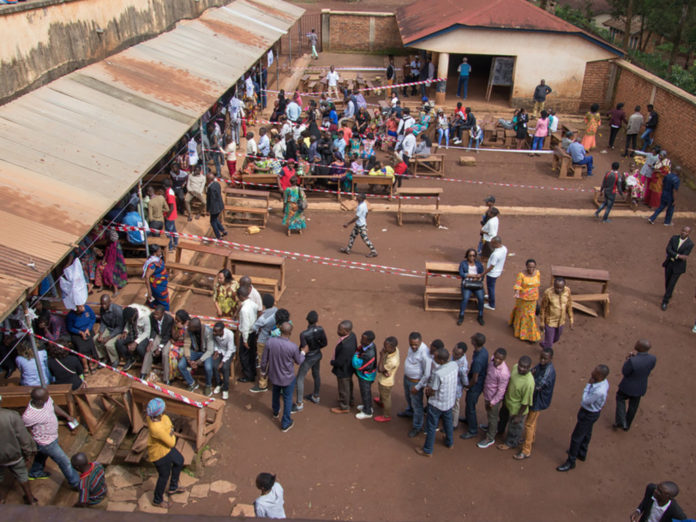The day after the announcement of the provisional results of the Congolese presidential election, the United Nations Security Council heard from the head of the United Nations Mission in the country (MONUSCO), the President of the Electoral Commission (CENI) and a representative of the Episcopal Conference (CENCO).
The Secretary-General's Special Representative for the DRC, Leila Zerrougui, spoke in Kinshasa, surrounded by Corneille Nangaa, President of the Independent National Electoral Commission (CENI), and Abbé Otembi of the National Episcopal Conference of Congo (CENCO) - two Congolese organizations whose data on the election results diverge.
"The implementation of the electoral process enters its final stretch".
On Wednesday night, CENI announced that Félix Tshisekedi, candidate of the Union pour la Démocratie et le Progrès Social (UDPS), had won the presidential election, ahead of Martin Fayulu of the Lamuka Coalition and Emmanuel Ramazani Shadary of the Parti du peuple pour la reconstruction et la démocratie (PPRD) backed by outgoing President Joseph Kabila. CENCO, for its part, declared that the presidential election results published by CENI did not correspond to the data collected by its observers.
Reactions to CENI's announcement were swift and varied, said Ms Zerrougui. Mr. Tshisekedi hailed his own victory as the President "of all Congolese".
Although the Front Commun pour le Congo said it would respect CENI's results, the Lamuka coalition denounced what it saw as electoral fraud, "with the potential to provoke disorder throughout the country".
While the results were greeted by scenes of joy in some Union pour la nation congolaise (UNC) and UDPS strongholds, many Lamuka supporters received the news "with a sense of disbelief", reported Ms. Zerrougui.
"Unfortunately, serious security incidents occurred in several places. The most worrying of these took place in Kwilu province, where violent demonstrations reportedly left at least twelve people dead, including two at the hands of the national police, and ten civilians killed with live ammunition, as well as major damage to public property", deplored the head of MONUSCO.
Ms. Zerrougui reported that MONUSCO is currently deploying teams to Kikwit, where the UN mission is not present, to discuss ways of defusing tensions. In Kisangani and several other localities in Kasai province, clashes and depredations have been reported, and allegations of injuries, arrests and deaths are still being verified.
The situation is also tense in several communes of Kinshasa, following clashes between supporters of Lamuka and the Coalition for Change (CACH) and, in some cases, also with the police, added the Special Representative, who deplored all these acts of violence and called on the Congolese people and security forces to show calm and restraint at this critical time.
The coming week could be marked by challenges and judicial review of the provisional election results, with the final results to be announced by the Constitutional Court within a week.
"The next few days will therefore be decisive for the conclusion of this historic electoral process", announced Ms. Zerrougui. The Special Representative assured that she would continue to use her good offices with all Congolese stakeholders to advocate calm and the use of established judicial procedures.
"Millions of Congolese men and women have demonstrated their commitment to the political process in their country and their determination to exercise their democratic right to vote," recalled Ms. Zerrougui. "We must therefore demonstrate our collective solidarity with them as the electoral process draws to a close and the Democratic Republic of Congo prepares for the first peaceful transfer of power in the country's history," she concluded.
CENI considers it has done its job
CENI President Corneille Nangaa acknowledged to the Security Council that the elections could not be organized in "absolute perfection", but, in his view, what was important was safeguarded. For Mr. Nangaa, CENI worked under difficult conditions, but "did what it could do".
"Three polls on the same day in a country like ours: it wasn't easy," stressed the Chairman of CENI, warning against the tendency to "wake sleeping demons". The main thing today is that the results are in," he said.
Following the reaction of the Episcopal Conference, CENI sent a letter to the President of CENCO to refute the early announcements the latter had made concerning electoral trends and its allusions to the name of the winner of the presidential election.
"CENCO will be responsible for what happens," warned Mr. Nangaa, before pointing out that a dozen organizations, with 4,000 observers accredited by CENI, observed these elections.
The Chairman of CENI called on the international community to support the new authorities, rather than seeking to weaken them now that the final results have not yet been announced.
CENCO calls for publication of minutes
Facilitator of the Saint-Sylvestre Agreement of December 31, 2016, which paved the way for the organization of elections in the DRC, CENCO recalled that it had taken part in the observation of the various polls held on December 30.
Speaking on behalf of the Episcopal Conference, Abbé Otembi reported that its observers had been present at all polling stations in the country, assuring that 40,850 accreditations had been obtained, and specifying that the 1,776 trained observers whose accreditation had been rejected were nevertheless able to carry out observations outside polling stations.
The CENCO representative said that his organization had taken note of the provisional election results. However, he added, analysis of the elements in his possession led him to believe that the presidential election results did not correspond to the figures provided by his observers.
Abbé Otembi called on the Security Council to show solidarity with the Congolese people, inviting its members to request publication of the minutes for each polling station, so that the candidates' data could be compared with that of the CENI, and so as to remove any doubt and put people's minds at rest. In the event of a dispute, CENCO called on the Security Council to invite the parties to "choose the path of truth and peace".


